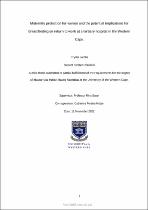Maternity protection for women and the potential implications for breastfeeding on return to work at a tertiary hospital in the Western Cape
| dc.contributor.advisor | Swart, Rina | |
| dc.contributor.author | Jacobs, Crystal | |
| dc.date.accessioned | 2023-03-03T07:10:04Z | |
| dc.date.available | 2023-03-03T07:10:04Z | |
| dc.date.issued | 2022 | |
| dc.identifier.uri | http://hdl.handle.net/11394/9678 | |
| dc.description | Magister Scientiae (Nutrition Management) - MSc(NM) | en_US |
| dc.description.abstract | Optimal maternal health and support in the workplace can have a positive impact on the health outcomes of the mother and baby. Therefore, legislation specifies that women be protected during the pregnancy period as well as on return to work. According to the International Labour Organisation (ILO), maternity protection includes maternity leave, cash and medical benefits, health protection in workplace, non-discrimination, job security, breastfeeding breaks, and access to childcare facilities. Adequate maternity protection in the workplace can result in benefits to the child’s long-term health and positive effects for workplaces. The aim of this research was to determine the availability of maternity protection practices in the workplaces and the potential implications for breastfeeding. | en_US |
| dc.language.iso | en | en_US |
| dc.publisher | University of the Western Cape | en_US |
| dc.subject | Maternity | en_US |
| dc.subject | Nutrition | en_US |
| dc.subject | Equality | en_US |
| dc.subject | Women | en_US |
| dc.subject | Western Cape | en_US |
| dc.title | Maternity protection for women and the potential implications for breastfeeding on return to work at a tertiary hospital in the Western Cape | en_US |
| dc.rights.holder | University of the Western Cape | en_US |

